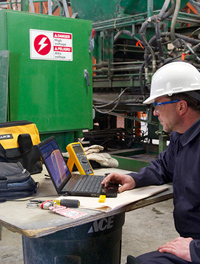"With the CNX 3000 you can connect the modules, close the panel door, move out of the arc flash zone and remove at least some of your PPE while you view the measurements."

Chipper Stohl has been working as an electrician since 1985, dealing with everything from high end residential wiring to installing, maintaining and troubleshooting commercial and industrial electrical systems. Since 2005 he has worked as a field service technician for Associated Electrical Contractors, Inc. (AECI) based in Woodstock, Illinois, northwest of Chicago. These days he works primarily in emergency troubleshooting and repair, but also does some installation and maintenance.
Stohl decided to put the new Fluke CNX 3000 wireless system to the test to see how the new tools measured up to his day-to-day tasks.
Stohl tested the CNX 3000 General Maintenance System kit, which includes the CNX 3000 Wireless Multimeter, the CNX 3000 AC Wireless Voltage Module, and the CNX i3000 iFlex™ AC Wireless Current Module. He added the optional CNX pc3000 PC adapter so that he could monitor multiple parameters simultaneously on a laptop. To see what the wireless components could do, he put them to work in general voltage and current monitoring applications at some of AECI's customer facilities.
In the process he found that the CNX 3000 wireless system actually expedited resolution of some of his trouble calls. In one such example he responded to a "motor down" call at a manufacturing plant. A 25 horsepower motor starter overload block kept tripping out.
"My first step for that type of call is to do a winding test on the de-energized motor. Measuring the balance of resistance readings gives me a good idea of the health of the motor windings," says Stohl. He used the Fluke CNX 3000 wireless multimeter to run that test and found normal results.
So the next step was to monitor the line voltage, load side voltage and load side current on the starter. He de-energized the panel, following proper arc flash procedures, and installed the wireless modules. He used the multimeter to monitor line voltage, the voltage module to monitor load side starter voltage, and the CNX i3000 iFlex AC Wireless Current Module to monitor load side current on the starter. Then he closed the panel door and moved to the laptop to view all three measurements in one display.

"I monitored the live reading on the laptop of all three modules during the startup inrush, running amps, volts, line, and load" says Stohl. "The panel door was closed so I didn't have to wear the full "bomb suit," just the standard PPE [personal protective equipment]."
Stohl monitored the starter for about two minutes and then reviewed the results on the PC. The measurements showed about a 10 volt differential between the load side voltage and the line side voltage, indicating a problem internally to the motor starter. When he opened up the starter he found broken-down contact surfaces, resulting in the voltage differential drop.
Stohl estimates that being able to set up three wireless modules inside the closed panel and monitor them simultaneously from a safe distance, allowed him to get to the root of the problem faster and with much less PPE time.
Based on his initial experiences with the CNX 3000 system Stohl is looking forward to applying it to more trouble calls because it:
- Maintains safety and reduces personal protective equipment (PPE) time."If you ask any electrician who is sweating under PPE, they'll tell you it's not a lot of fun to wear and it's hard to see out of with the tinted helmet shield," says Stohl. "With the CNX 3000 you can connect the modules, close the panel door, remove yourself from the arc flash zone and remove at least some of your PPE while you view the measurements."
- Provides a complete system."Ninety-five percent of our work involves voltage, current, continuity, ohms, and resistance checking and you can do all of that with this system and read multiple test points at once, which saves time," says Stohl.
- Simultaneously monitors voltage and current."If you're looking for a voltage drop you can see what the current is doing to quickly identify that there's something going on here," says Stohl.
The Fluke wireless system
One central meter that receives wireless voltage, amperage and temperature readings from multiple sister meters placed in a variety of locations up to 20 meters away.
Go to PDF version of Taking a Wireless Approach Gets to the Root of the Problem Faster